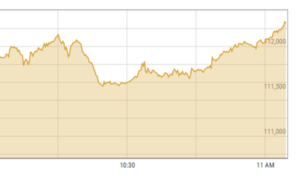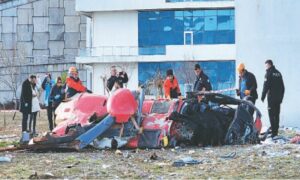Maybe it is just kismet and “Allah ki meherbani” and the timing of his sporting ascent coinciding with Salman becoming his coach, like DNA just working out a certain way, creating a certain something, existing in the right time and space.
Arshad Nadeem is the best he can be. Yet, he has nothing. At least, nothing that makes him the best in the world. But he’s almost there, on the very cusp of it: a javelin throw away from making history and ending Pakistan’s three-decade long wait for an Olympic medal. It’s now about waiting and watching, and trusting the process. And praying. The only talisman he carries every competition is “puri mulk ke duaien.”
He will do so again at the Paris Olympics on Tuesday, when he steps into the Stade de France; an imposing venue that’s a far cry from the Punjab Stadium in Lahore where Arshad was training about a month ago. Arshad has been to the Games before; he finished fifth on his maiden Olympics appearance in Tokyo three years ago. He’s competed in Paris as well — but at the smaller Stade Sebastian Charlety only last month at the Diamond League meet where he finished fourth.
For all the venues across the globe he’s been to, he seems to have made peace with whatever decrepit facilities there are back home. The gym at the Punjab University is a throwback to the seventies. A cycling machine barely holds itself up in one corner, lumpy punching bags hang from another. The newest piece of equipment here is older than the 27-year-old himself, who has quietly begun stacking weights for his clean and jerk. The nakedness of a space that is supposed to be foundational in his quest for Olympic glory is startling.
Arshad changes from a light grey t-shirt to a dark grey one halfway through training, courtesy of the sweat dripping off him like a leaky faucet. “What will be left of him after all this sweat?” his coach Salman Butt quips before swinging back to Arshad squatting his own bodyweight, waiting for the “Up!” that comes from Salman, waving his arms like an orchestra conductor.
Their monosyllabic radio communication holds depth unintelligible to onlookers, watching the duo exist in a faraway orbit. “Kitne lagaon?” asks Arshad “Saath. Three sets,” is Salman’s answer. They’re speaking an indecipherable language —no, not Punjabi— a language that only exists between an athlete and his coach, commanding utmost discipline and focus from the student.
Arshad’s Indian rival, defending Olympic champion Neeraj Chopra, spent the summer in Europe acclimatising for the Olympics. His European rivals are competing at an endless list of competitions in the warm up to Paris. Salman knows that Arshad needs to be in a climate-controlled environment — “what we really need are elite training centres in Pakistan” — but in this moment, on July 1, neither of those oases will materialise, so they forge ahead.
The gym is draconian, stuck in the era it was built for. But in Pakistani terms it is “simple”, like Nadeem, who has this malleability to make do with what he has, no fuss no frills. He’s always been that way, his brother Aleem tells after a training session the next day as he walks the length of the Punjab Stadium field to pluck out the javelins Arshad has pierced the ground with. “He’ll never make it known to anyone that he’s this big athlete.”
Nadeem is chameleon-esque in the way he goes from being a gladiator with a spear to gentle giant wanting to give back to his community. He is Atlas, holding up the nation’s expectations since shooting to stardom in Tokyo. “When you achieve something, you have a responsibility, an obligation,” Salman says as Arshad warms down on the synthetic red-brick rubber track.
Nadeem shrugged when asked if coaching is on the cards post-retirement, but it was evident in the way he was gently mentoring a clueless, aspiring 11-year-old javelin thrower that evening that his first instinct is to look out for others. He is the embodiment of that one stanza from Rudyard Kipling’s ‘If’, where he can talk with crowds and keep his virtue, walk with kings nor lose the common touch.
“He’s disciplined, dedicated, humble, respectful — all qualities of a good human,” Salman answered slowly, thoughtfully when asked what his protégé was like off the field.
In the absence of world-class facilities, perhaps this is what’s gotten him as far as he’s gone. And having a coach like Salman, who was tasked with polishing the national gem that Rasheed Ahmed Saqi excavated at an athletic competition while Nadeem was still in school. Every milestone he’s hit since his Olympic debut he credits to Salman’s brilliance, which earned him directorship of the Asian Athletics Association in 2018.
But the depth of knowledge from Salman alone can’t explain Arshad’s mammoth throws in recent years. He isn’t a product of sensible sports governance and carefully planned scholarships and hyper-focused training the way his competitors are. Maybe it is just kismet and “Allah ki meherbani” and the timing of his sporting ascent coinciding with Salman becoming his coach, like DNA just working out a certain way, creating a certain something, existing in the right time and space.
“They say your coach is your ‘roohani baap’ [spiritual father], that’s what he is for me,” says Arshad on his relationship with Salman. “Wherever I make a mistake, he tells me off, when I need that nurturing and love, he provides that, just like a father does. I’ve been blessed with a coach like him who encourages me when I need it, scolds me when I need it; that’s what helps me perform. My medals speak volumes for the kind of coach he is.”
It’s the sport’s ultimate prize they’re after in Paris but the roohani baap reflects on the journey he and Arshad are undertaking.
“The Olympics is just one stop in the longer journey of things, you know,” Salman tells. “In the greater scheme of things. Yes, it has its own afadiyat [benefit]. It’s the biggest show on Earth, the biggest sporting show on Earth.”
The only competition Arshad has going into Paris is this 6’3“ guy called Arshad Nadeem, who he’s been competing with consistently since taking up the sport. His signature trait as a thrower is that he fights till the sixth and final throw, “puri duniya yeh janti hai.” It’s how he sneakily crept up to snatch his gold medal at the 2022 Commonwealth Games, and it’s how he wants to end his night at Stade de France come Thursday, when the javelin final will take centrestage.
Tuesday, however, is when Arshad will take the first step towards that final. Every August over the last few years since he rose to national consciousness, Arshad has thrown his wand to give the nation a bit of magic. The burden of expectation has only risen with each event and there is burning anticipation that he will make it to Thursday’s final.
Assuming all the top dogs make it through, the podium finish is anyone’s game. Holder and world champion Chopra has consistency and charisma, but he hasn’t joined the elite 90m club just yet. Anderson Peters has a monstrous 93.07m personal best throw — better than everyone else in the field — which he hasn’t duplicated in two years.
Arshad has been injury-plagued almost every season, but that doesn’t seem all that bad compared to Peters being tossed off a party boat after the crew beat him up, right after he won CWG silver and flew home.
Teenage sensation Max Dehning has the season’s best throw with 90.2m, which seems like a shot in the dark after he followed that up with a string of mediocre throws. With Julian Weber and Jakub Vadlejch in prime shape, perhaps the Europeans will reclaim their dominance in the sport that the South Asians snatched from them three years ago and haven’t given back since.
Arshad is not only facing competition on the field but off it as well. “If you were to compare what we have and what the others have, we’re operating on a shoestring budget,” rues Salman. “We have a camp provided here. We try to get a ground [field], sometimes we get it, sometimes we don’t. This is what we’re lacking. We need to develop athlete training centres, elite training centres that are different from regular centres.
“We must realise that we don’t have that environment, we don’t have that mindset, but we must develop, if we want to come into any race. If we want to come into the international arena, compete, win, then we must develop accordingly.”
The future of sports in Pakistan is not bright. It’s dim, at best. Bureaucracy has left athletes grappling through the dark to find light at the end of the tunnel, the very tunnel Nadeem will be walking out of and into the Olympic stadium this week.
The nation will then watch with bated breath as he throws his javelin almost as far and fast as Usain Bolt runs, watching the 800gram spear soar through time and space, and potentially transcend 32 years of Games failure, to land at a number that decides the nation’s Olympic fate.
An abridged version of this story was published in Dawn on Aug 6.
Header image: Arshad Nadeem takes a breather during a gym session at the Punjab University on July 1. — Photo by author







